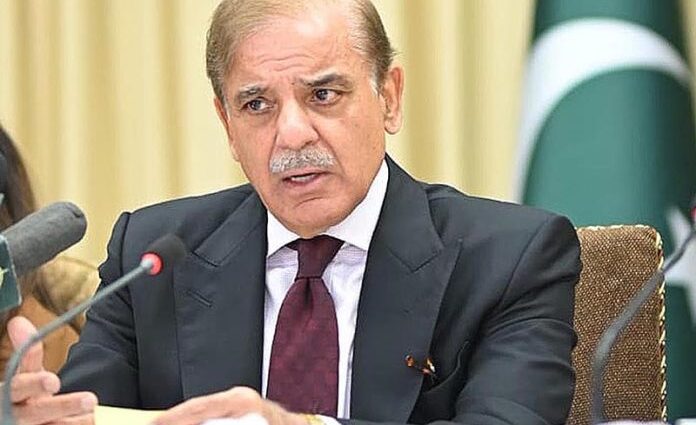PM Shehbaz says Pakistan should not be forced to go out with a ‘begging bowl’ to rich polluting nations after the floods
Says Pakistan facing an unprecedented crisis of health, food security & internal displacement after ‘apocalyptic’ monsoons
Says the gap between our needs & what is available is too wide & it is widening by the day
LONDON/ISLAMABAD ( Web News )
Prime Minister Main Muhammad Shehbaz Sharif has said Pakistan should not be forced to go out with a “begging bowl” to rich polluting nations after the floods that have devastated the country and said he would be seeking “climate justice” from the international community.
Speaking to the British newspaper, “The Guardian”, PM Shehbaz Sharif warned that Pakistan is facing an unprecedented crisis of health, food security and internal displacement after the “apocalyptic” monsoons which put a third of Pakistan’s regions under water. Some areas were hit by 1.7m of rainfall, the highest on record.
Scientists have determined that the floods were due to climate breakdown. But with Pakistan responsible for 0.8% of global carbon emissions, Shehbaz Sharif said it was the “responsibility of the developed countries, who caused these emissions, to stand by us”.
“I’ve never seen this kind of devastation, inundation and suffering of our people in my lifetime,” said Shehbaz Sharif. “Millions have been displaced, they have become climate refugees within their own country.”
While the international community has given billions in funds and donations and commitments for further support, Shehbaz Sharif was clear it was “not enough”. “The enormity of this climate-induced catastrophe is beyond our fiscal means,” he said. “The gap between our needs and what is available is too wide and it is widening by the day.”
The official death toll from the floods is 1,600, though many estimates on the ground have been higher. More than nine million people have been displaced and over 2 million homes destroyed, and millions of families have been forced to live in makeshift tents or shelters on roadsides.
The extent of the damage has been put at between $30bn and $35bn but Shehbaz Sharif said it was “a rough estimate, it could be more”, with more than 30,000km of roads destroyed along with bridges, railways and power lines, as well as 4m hectares (10m acres) of crops washed away.
“Let me be clear, this is about climate justice,” said Shehbaz Sharif. “We are not blaming anybody, we’re not casting allegations, what we are we saying is this is not of our making but we have become a victim. Should I be asked to cast my appeal into a begging bowl? That is double jeopardy. That’s unjust, unfair.”
Shehbaz Sharif was adamant that even with the billions in upcoming foreign debt repayments, and the billions more now in flood damages, the country had averted default though the IMF deal, and would still be able to service the rest of its foreign debt payments, which total around $22bn for the next year. “No way. We will not default,” he said.
Shehbaz Sharif confirmed they would be talking to “everybody” – including China and the Paris Club – about the possibility of foreign debt moratorium. “What we are asking for is fiscal space but not through the burden of more debt,” he said.
“I concede that, because of the vastness of the problem, we have not been able to do the job so far as it should have been done,” said Shehbaz Sharif. “But look at the distances alone. Some of these areas were cut off completely.”
Shehbaz Sharif was insistent that the Benazir income support programme (BISP) being used to disburse the flood relief funds is known for its transparency.
Shehbaz Sharif said while he was grateful for the “very touching words and statements”, it was “all very fine but more important is practical demonstration of these statements into action”. He said: “While they are doing a very good job, and we appreciate it, this is not enough. They must come forward with a far better and a far bigger plan to rescue us and rehabilitate us and put us back on our footing.”
Shehbaz Sharif pointed to the unfulfilled promise made by rich nations over a decade ago to commit $100bn a year in a climate fund for less developed nations on the forefront of the climate emergency. “Where’s that money?” asked Shehbaz Sharif. “It’s high time that we question and remind these countries to fulfill their commitments and pledges they have made.” “We’re not asking about reparations,” he said. “No, we’re not. I don’t think talk of reparations is proper at this point in time. What I am saying is that they should take notice of the situation, take responsibility and act speedily before it’s too late, before the damage becomes irreparable – not just for Pakistan, but for the world.”

